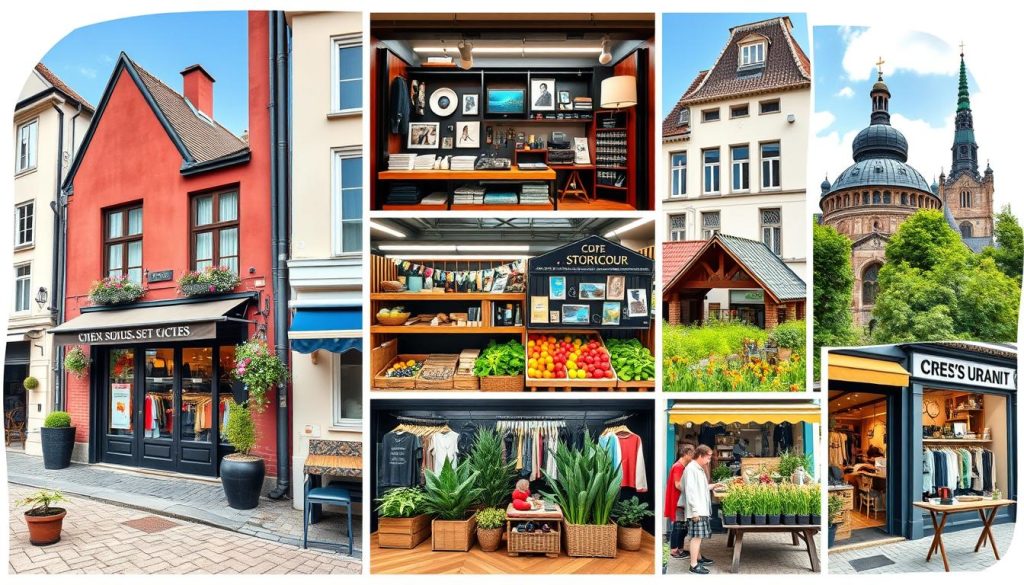Finding the best businesses in Europe to start is key for new entrepreneurs. The EU single market makes it easier to start in many countries at once. This is known as a multi-country business model.
Statista reports show that Europe’s start-up scene has seen over €41 billion in investments. This highlights the many chances for new businesses. We will look at promising sectors and important factors for starting a business in Europe.
Understanding the European Market Landscape
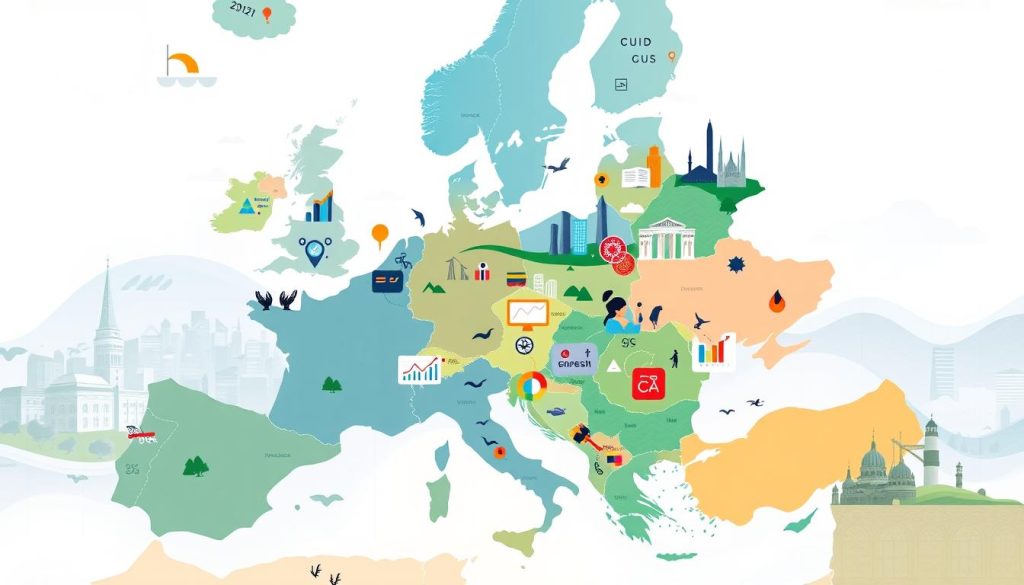
The European market is full of life and variety. It has different tastes and economic states in each country. The European Commission has shown that the business world is bouncing back after COVID-19, but not evenly. This uneven recovery affects where and how new businesses can grow.
To get a good grasp of the European market, it’s key to understand each country’s unique traits. Business owners need to look at several things, such as:
- Local consumer behaviour and trends
- Economic health and growth rates
- Regulatory environments and compliance
It’s vital to create specific plans for entering the market. These plans should take into account the differences between regions. They should also focus on making offers that appeal to local people. This careful approach can help a business thrive in different parts of Europe.
Factors to Consider When Starting a Business in Europe
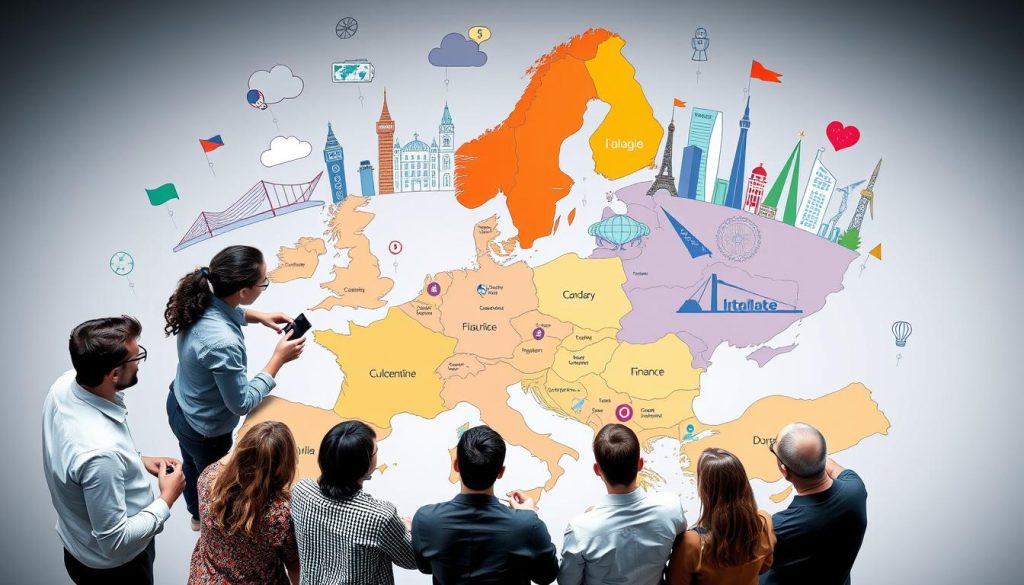
Starting a business in Europe needs careful thought about many things. You must know what the market wants. This helps you make products and services that people will like. It’s also important to know who your competitors are.
Doing market research helps you understand these things. It gives you the information you need to make smart choices.
Another important thing is the resources you have. This includes money, people, and the tools you need. You should think about if you can find skilled workers and the technology you need. These entrepreneurship factors affect how well your business can run.
Every country in Europe has its own rules for businesses. The OECD says there are big differences in tax laws, starting a business, and rules about jobs. It’s important to learn about these rules in the country you want to start your business in. This helps you avoid problems and follow the law.
Knowing about the local culture is also key. It helps you talk to customers and partners better. Being part of the local community can make your brand more popular and keep customers coming back. This is very important when starting a business in a place with many different people.
Good business to start in multiple countries in Europe

Starting a business in several European countries can be very rewarding. It lets you reach more markets and spread out risks. McKinsey found that companies in many markets grow faster, showing the benefits of this approach.
Advantages of a Multi-Country Business Model
Starting international ventures can bring many benefits. These include:
- More people to sell to, growing your customer base.
- Different ways to make money, helping you through tough times.
- Access to new skills and resources from around the world.
- A stronger brand image from being seen globally.
Challenges faced when operating across borders
But, running a business across borders comes with its own set of challenges. These include:
- Dealing with different rules in each country.
- Changes in currency value affecting your prices and profits.
- Managing complex supply chains.
- Handling cultural differences that might change how you operate and what customers want.
Popular Sectors for Business Opportunities

The European market has many lucrative business sectors. These offer great chances for new entrepreneurs. Technology start-ups, health and wellness, and eco-friendly businesses are especially promising.
Technology Start-ups
Technology start-ups in Europe are growing fast. This is thanks to digital changes in many industries. Fintech and e-commerce are leading the way.
Cities like Berlin and London are hubs for tech innovation. They attract talent and investment. Entrepreneurs in tech can find strong growth and support.
Health and Wellness Enterprises
Health and wellness are changing how people live. This has created new business chances. Fitness, nutrition, and mental health services are in demand.
Entrepreneurs can offer products and services that meet these needs. This taps into the growing interest in health.
Sustainable and Eco-friendly Businesses
Eco-friendly businesses are becoming more popular. This is because of growing concerns about climate change. More people want sustainable products.
Entrepreneurs in sustainable fields can benefit from this trend. They can innovate and help the environment while meeting consumer needs.
Best Countries for Start-ups in Europe
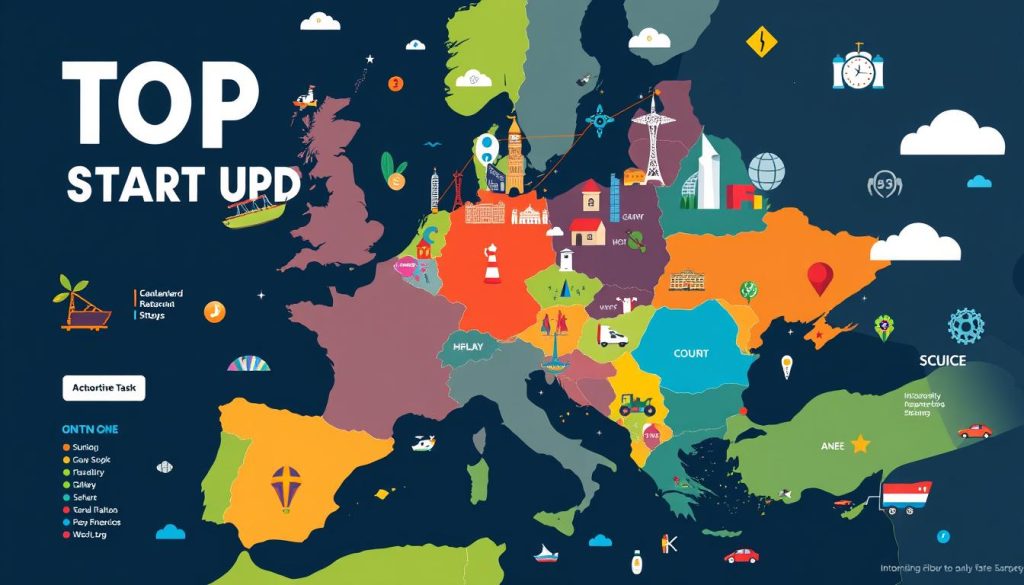
Starting a business in Europe is full of chances, with some countries leading the way. Germany, France, and Spain are top picks for start-ups. Each country has its own strengths, making them great for new businesses to grow.
Germany: The Economy Powerhouse
Germany’s business scene is strong, thanks to its solid economy and focus on innovation. It has a great setup for research and development, helping entrepreneurs. With skilled workers and government support, start-ups can really take off here.
Germany also offers special deals for investors in key areas. This makes it a top spot for start-ups in Europe.
France: Innovation and Creativity Hub
France is buzzing with start-ups, especially in tech and creative fields. The government helps entrepreneurs with funding and advice. This draws venture capitalists, making France a prime spot for new businesses.
France aims to be a leader in innovation. This makes it a great choice for start-ups in Europe.
Spain: Growing Enterprising Ecosystem
Spain is a great place for start-ups, thanks to its low living costs and diverse people. It’s known for its entrepreneurial spirit, especially in tourism and tech. Foreign investment has made Spain a key spot for start-ups.
This environment is full of chances for new businesses. It’s a top choice for start-ups in Europe.
Understanding Local Regulations and Compliance
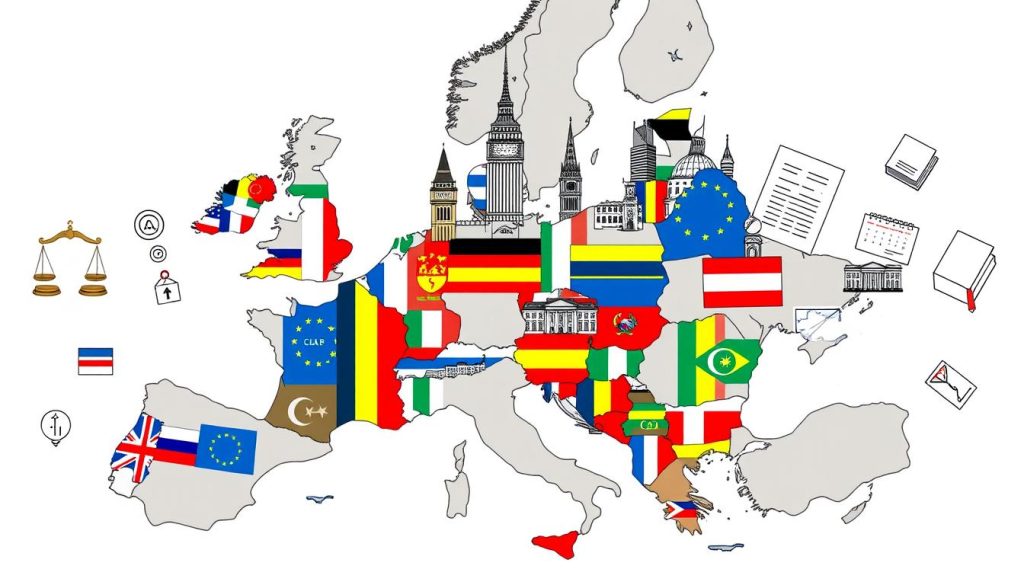
Entering the European market requires a deep understanding of local laws for businesses. Each country has its own legal rules, covering taxes, employment, and industry standards. Knowing these rules helps businesses run smoothly and avoid legal problems.
The Doing Business Index shows that good laws make it easier to start and run a business. Countries like Germany and France have clear rules that help businesses work well. But, dealing with complex or unclear laws can be a challenge for entrepreneurs.
- Understanding tax obligations and incentives available for businesses.
- Compliance with employment laws ensuring worker rights and fair treatment.
- Adhering to industry-specific standards that can vary widely across sectors.
Knowing these things helps businesses follow the law in Europe. It’s a key step towards success in the competitive European market.
Access to Funding and Investment Opportunities

Entrepreneurs in Europe have many funding options for their businesses. There’s a big push for innovation, especially in tech and green sectors. Looking into government support can really help a startup succeed.
Government Grants and Support
Government grants are a big help for new entrepreneurs. They offer money without needing to pay it back. Many European countries have programs to help start-ups grow.
- In the UK, the Innovate UK programme gives grants to projects with big growth potential.
- The European Union has programs to support research and innovative projects in member states.
- Germany has support schemes for tech and sustainable startups.
These programs not only give money but also offer mentorship and resources. This helps businesses to grow well.
Venture Capital Trends in Europe
The venture capital scene in Europe is growing fast, especially in tech and green areas. There’s a lot of investment, showing these trends:
- More money is going into new technologies like AI and digitalisation.
- Green businesses are getting a lot of venture capital, showing a move towards eco-friendly.
- There’s more teamwork between venture capitalists and entrepreneurs, leading to strong partnerships.
Entrepreneurs should look to use venture capital in their area. They should use networks to meet investors. Both government support and venture capital trends are key for success in Europe.
Marketing Strategies for Your European Business

Effective marketing strategies are key for businesses to grow in Europe. Knowing what European consumers like is crucial. Personalised marketing, based on deep consumer research, gets more attention. PwC says people like ads that speak to them personally.
Using many marketing channels is important in Europe. Mixing digital and traditional methods boosts brand visibility. Here are some strategies to consider:
- Targeted social media ads to reach specific groups.
- Local content in regional languages and cultures.
- Search engine optimisation for online presence in many languages.
- Working with local influencers to gain trust.
Adding these to your marketing plans can improve your reach and connect with customers better. It’s essential to understand European consumer tastes for success.
Networking and Building Relationships in Europe

Networking in Europe is key for any business wanting to succeed. Building strong relationships helps entrepreneurs understand market trends and find new opportunities. Talking and working together gives a deeper view of the business world across Europe.
Attending European Business Conferences
Business conferences are great for networking in Europe. Events like the Web Summit and Mobile World Congress bring together industry leaders. They offer chances to meet investors, partners, and other entrepreneurs, boosting your business’s visibility.
- Panel discussions featuring renowned thought leaders
- Networking sessions designed for relationship building
- Workshops for skill development and knowledge sharing
Going to these events helps build lasting professional connections. It also gives valuable insights to guide your business to success.
The Influence of Cultural Differences in Business

In international trade, cultural differences are key. They shape how we interact and what we expect. Knowing these differences helps businesses adapt to new markets. This understanding leads to better connections with customers.
Customising Your Offerings for Diverse Markets
Successful companies make their products fit local tastes. They do this in many ways:
- Using local sayings in marketing.
- Creating products that match local food or fashion.
- Offering customer service that fits local ways of talking.
By embracing these cultural differences, businesses can make customers happy and loyal. Tailoring marketing to local tastes strengthens a brand. This approach helps businesses succeed in diverse markets.
The Role of E-commerce in European Markets
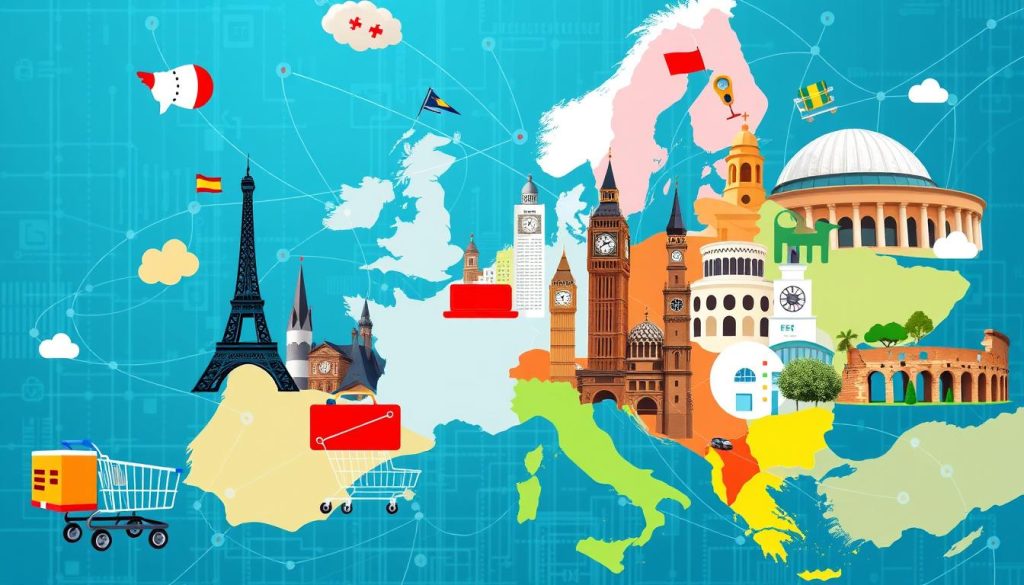
E-commerce in Europe is changing how people shop online. After the pandemic, more people are buying things online. This means businesses need to keep up with these changes to do well.
Online shopping is growing fast. This gives new businesses a chance to succeed. They can sell more and reach more customers.
For businesses to thrive, they must make their online shops better. This means making it easy for customers to find what they want. It also means making the site look good and offering things that customers like.
Good online shopping experiences keep customers coming back. This is key in a competitive online world.
Using new tech like AI and data can help businesses too. It lets them understand what customers want. This way, they can offer products that fit the market’s needs.
Franchise Opportunities Across Europe
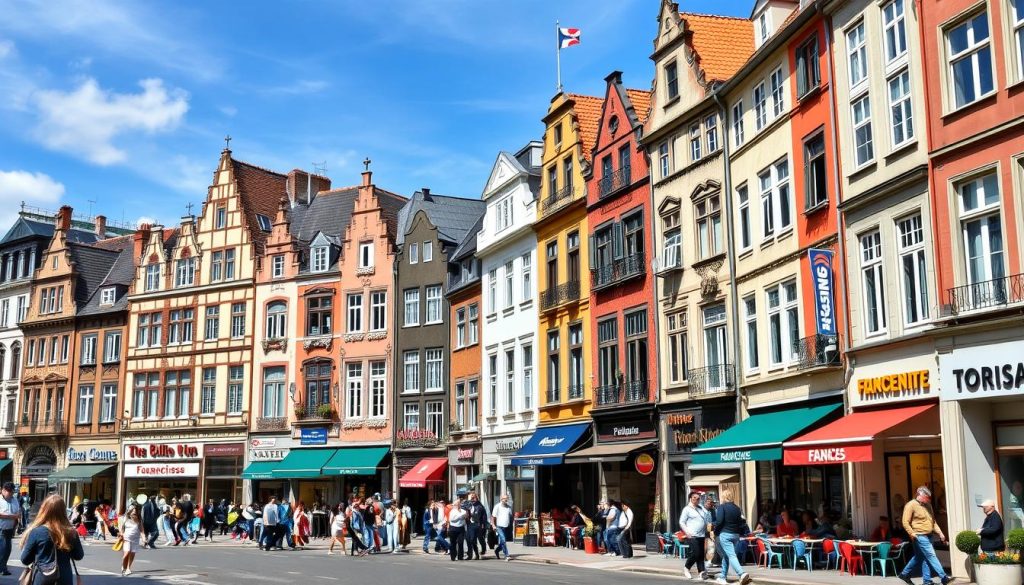
The franchise market in Europe has grown a lot in recent years. It’s now a great choice for those wanting to start their own business. With franchise business Europe, you can start a business with a well-known brand. This makes it easier to begin without the usual risks.
Successful Franchise Models
Many successful franchises have popped up in Europe. Brands like McDonald’s and Subway show how strong a franchise can be. They offer a chance to invest in a business that’s already proven to work well.
- McDonald’s: A global leader with extensive support and operational guidelines.
- Subway: Known for its flexible formats and healthy food focus, appealing to a wide consumer base.
- Starbucks: Combines coffee culture with a strong community presence.
- Domino’s: Rapid expansion driven by technological innovation and a robust delivery system.
These franchises show that there are many chances to succeed in different areas. Investing in a franchise means you can enter the market with a well-known brand. This often leads to faster profits.
Utilising Social Media for Business Growth

Social media marketing has changed how businesses grow. It’s now key for companies in Europe. Sites like Instagram, LinkedIn, and Facebook let brands talk to people, building strong connections. This can boost sales and keep customers coming back.
Companies need smart digital marketing plans to reach their audience. Knowing how each platform works is crucial. For example, Instagram is great for pictures, while LinkedIn is better for business-to-business talks.
A study by Hootsuite shows social media’s power in getting customers involved. Businesses that focus on social media see their brand and customer loyalty grow. With the right strategy, businesses can really take off, showing the importance of a strong online presence.
Case Studies of Successful European Ventures
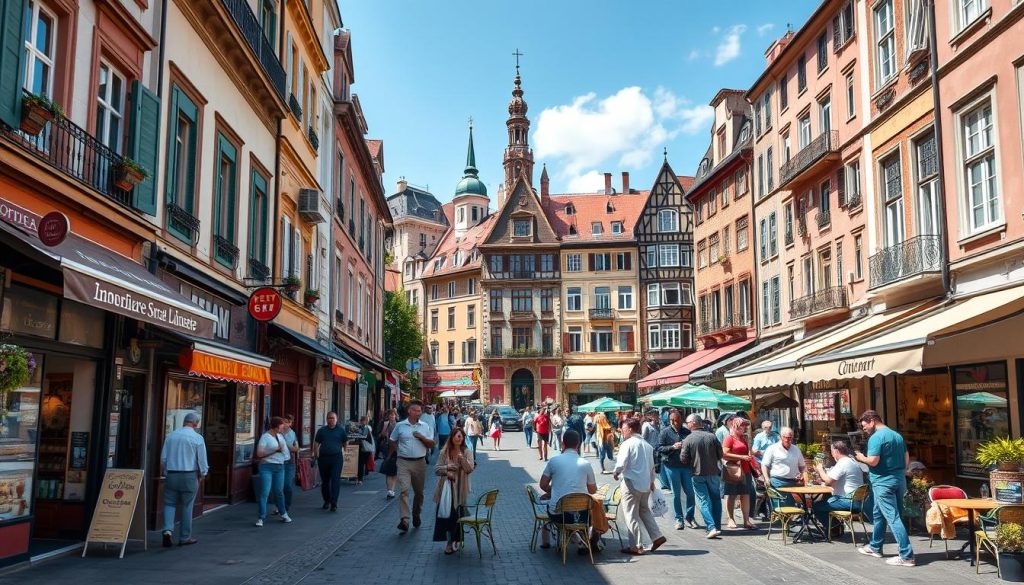
Looking at case studies in Europe gives us great insights. Companies like Spotify and Delivery Hero show how new ideas and quick action can lead to big wins. They’ve changed with what customers want, becoming top names in their fields.
Insights from Thriving Start-ups
Successful ventures in Europe teach us a lot. Here are some key lessons for new business owners:
- Putting customers first often keeps them happy and loyal.
- Being open to change in what you offer can meet market needs.
- Using technology can make things run smoother and reach more people.
Learning from Failures
Learning from failures is just as crucial. European case studies show common mistakes start-ups make:
- Not doing enough market research can lead to wrong products.
- Ignoring money matters can cause growth problems.
- Not building a strong brand can make it hard to get into the market.
Future Trends in the European Business Landscape
The future of business in Europe is set for big changes. New tech and a focus on being green will lead the way. As things change, businesses will use digital tools and rethink old ways. This opens up new chances for growth and profit for entrepreneurs.
Market trends show green tech and online shopping will grow a lot. This is because people want to be green and enjoy online shopping. Smart business leaders can use these trends to lead in new markets.
Being able to change quickly is crucial in Europe’s fast-paced business world. Businesses that can adapt and innovate will stand out. By keeping up with these trends, companies can not only survive but also do well in the changing market.

